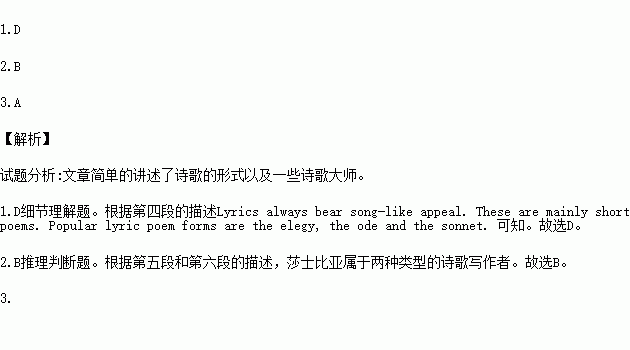题目内容
Poetry, one of the essential art forms of literature, is a brief and easy way to express our feelings. Moreover, everyone understands it in their own way. Some find relief in poems; some read them simply for peace; some read poems for simple artistic pleasure.
There are some special features of poetry, which make it quite different from other forms of literature. First of all, poems have rhythmic patterns. Generally most parts of a poem follow the same form of rhythm. Poems may have rhyme, but they don't have to. The lines are neatly arranged together so that they express a particular feeling or emotion.
There can be various types of poems but according to the pattern or the form, there are mainly three types:
Lyrics: The lyric mainly concentrates on human thoughts and emotions rather than a story. Lyrics always bear song-like appeal. These are mainly short poems. Popular lyric poem forms are the elegy, the ode and the sonnet. William Shakespeare, Edmund Waller and Keats are some of the greatest lyric writers of all times.
Narrative poems: This type of poetry tells a story. Narrative poems are usually long poems. Epics(史诗) and ballads fall under this type. Some of the greatest epic poets are John Milton, Dante, Edgar Allan Poe, Alexander Pope, William Shakespe are, etc..
Dramatic poems: Any drama that is written in verse is a dramatic poem. These poems generally tell a story. Black verse, dramatic monologue(独白) and closet drama belong to this type. William Shakespeare, Christopher Marlowe and Ben Jonson are some of the greatest dramatic poets.
Whatever the form is, one thing, which cannot be denied, is that poetry is one of the most powerful tools to express our feelings.
1.What do we know about lyrics?
①They are similar to songs.
②They usually tell stories.
③They are not very long.
④The sonnet is a type of lyrics.
A. ①②③ B. ②③④ C. ①②④ D. ①③④
2.We can know from the text that .
A. poems are weak in showing feelings
B. some poets write more than one type of poem
C. narrative poems are shorter than lyric poems
D. the sonnet and the ballad belong to the same type
3.This passage is written mainly to .
A. tell us some simple facts about poetry
B. teach us how to write poems
C. give some advice on reading poems
D. make us interested in poems

